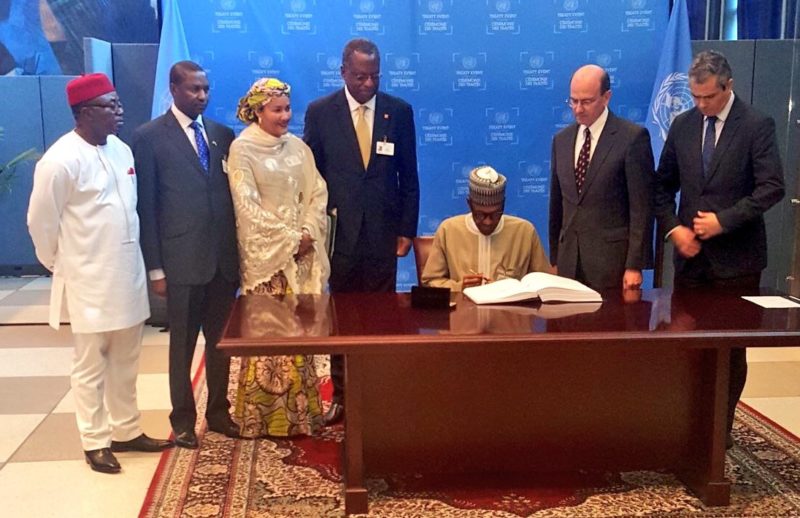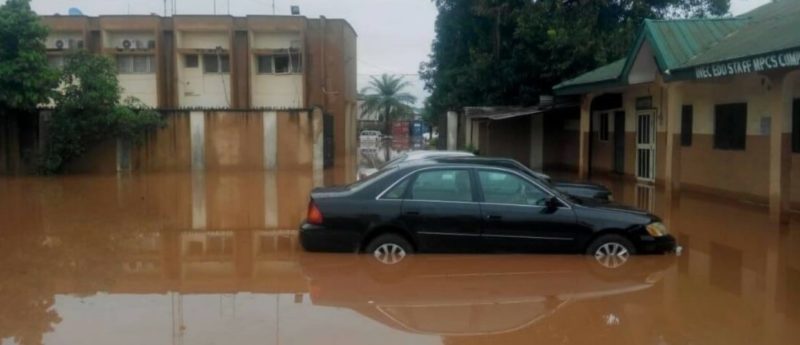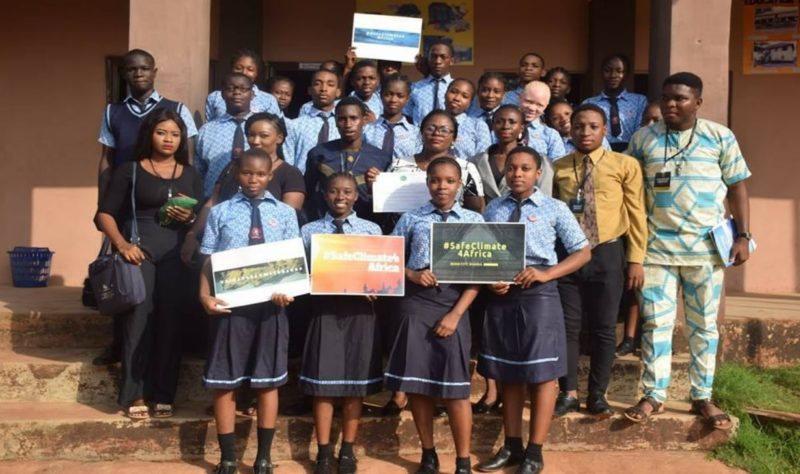Since the coming together of countries to chart a path for global climate in 2015, the topic of climate change has gained much relevance and the spotlight in national discussions. Nigeria, who happens to be a signatory to this contract, did not pay the due attention to implementing the resolutions met at the conference until climate change came knocking at the borders of the country.

The incidents of recurrent flooding, typhoons and evident temperature increase are fast becoming a norm in the country. This has pushed the government and policy makers to pay the necessary attention to climate action in the past months. This saw Nigeria being represented by a train of delegates headed by the Minister of State for the Environment, Ibrahim Usman Jibril, in COP23 that was held in Bonn, Germany last year November. The president alongside key players in the country politics were also participants at the One Planet Summit hosted in Paris, France a month after. These activities of the government has put “climate stories” in the league of mainstream issues in the country but the implementation of the Paris Agreement of 2015 still remains an uncompleted task leaving the citizens at the mercy of climate change.
A perfect case study of this theme is Benin City. Benin City, the capital of Edo State, is an ancient town globally known for its dexterity in bronze casting and home to the most revered royalty in Africa – Oba of Benin. It is the fourth largest city in Nigeria with its population equaling that of Luxembourg, Cape Verde and Seychelles put together. The prevalence of flooding in this elephantine city can be easily attributed to its high greenhouse gas emission and carbon usage.
Benin City plays host to the International Centre for Bronze Casting that attracts millions of tourists across the world. This monument unfortunately contributes a large quota to the high carbon emission in the Niger Delta region. Artisans make use of coal at high temperatures to mold and cast sculptures.
Chris, a sculptor in Igun, clearly spells out the tedious process involved in bronze sculpturing. He explains that coal is used to generate heat for melting the wax used in carving the bronze to desirable shapes and structures. He even jokes that there is no fair person in Igun because the heat generated does a lot of damage to the skin of the artisans. He further states that the governor of the state promised to provide ultra-modern facilities that would aid cheap, clean and timely bronze artefact production but they insisted on sticking to the archaic method, claiming it was passed to them by their forefathers and must be transmitted to their children without adulteration from the westerners.
This high level of carbon emission has left Benin City stranded with endless flooding when it rains which has led to an inevitable loss of lives and properties, devastating health effects, traffic congestion, relocation of industries and manpower, cut-off in power supply and low internally-generated revenue (IGR). In recent times, Benin residents have had unforgettable experiences that would not be quick to erase from their memory such as the massive flooding that occurred on Saturday, October 7, 2017, sacking thousands from their homes and causing millions of naira in damages to properties.
Amongst the worst affected places was the Edo State headquarters of the Independent National Electoral Commission in Benin City. A section of the building’s perimeter fencing collapsed after two hours of heavy downpour, pushing in muddy waters inundated vehicles, files, computers and card reading machines. Another incident was when the landlords of Anigboro Street and its environs in Egor Local Government Area of Benin City sent a Save Our Soul (SOS) to the state governor, Mr. Godwin Obaseki, in August 2017 appealing to him to come to their aid before their houses and property were swept away by flood in the area. In the message by Elder Roland Irorere, Chief Frank Atoe, Mr Iro Omorodion, Mr Gibson Sylvester and Mr Peter Omorogbe for others, the residents said that their cry to the previous administration of Adams Oshiomhole about the ravaging flood was unheeded.

“Your Excellency, the flood has reached an alarming rate and if nothing is done urgently about it, the whole houses in the area and property might be washed away during this rainy season. Many landlords and landladies in the area have already fled their homes as a result of the flood and their abandoned houses have become hiding places for criminal elements,” they wrote.
The residents of Uhunmwode community in Benin City are another set of people with a first-hand experience of climate variability especially with regard to food crop production which is a common sight in the area. Farmers are beginning to notice the impacts of climate variability on their food crop production. They found out that climate variability/change has caused poor crop yields, reduced soil fertility, increased flood, poverty and food shortage.
Food crop agriculture in Uhunmwode LGA does not only provide food for the inhabitants of the area, but also for nearby local government areas and cities. However, the recent changes in patterns of climate/weather elements are a huge challenge to food crop production in the area. For the crop farmers in the community, climate has greatly varied over recent years with rainfall decreasing and air temperature increasing. This combination is not in any way healthy for crop production, especially for farmers who are dependent on rain for their farming, as in the Uhunmwode community. Also, onset of rain in the area, according to the farmers, has shifted. This also in no small measure will adversely affect food crop production, as adjustment may be difficult, especially where what will happen the next farming season is not known.
These incidents have seen the birth of organisations that are geared towards sustainable development and climate justice in the city. A vivid example is the Borokinni Joshua Initiative, a non-profit that centres on climate action. The group flagged a campaign in Benin City tagged #SafeClimate4Africa in collaboration with the Nigeria Society of Victoria (NSV). The campaign featured awareness-raising, school tours and round table discussions. The team of five visited Patricia Private School (Ikpoba Hill) and Torch Bearers Academy (Ikhueniro), in November 2017 to sensitise and intimate the staffs and students of these institutions on climate change which spread across various topics such as carbon pricing, mitigation and adaptation of cities, greenhouse gases, and deforestation, among others. They aired their views on radio stations and online sites, stressing the role of Benin residents in ensuring a safe climate for all. Their focus lies strongly on improving education, awareness-raising and human and institutional capacity on climate change mitigation, adaptation, impact reduction and early warning.
According to the Team Lead, the objective was to spring thought-provoking discussions cum solutions on the responsiveness of the government to climate action and the need for a responsible citizenry as regards the subject as well.

The state government is also determined to find a lasting solution to this menace. In 2013, N500 million was set aside to fund a rescue project. However, due to the fact that the amount was grossly inadequate for the project, it began the search for a viable partner counterpart with the ability to provide counterpart funding. It approached the federal government with an appeal to have the project bankrolled with counterpart funding from the Ecological Fund but it was turned down.
The then state governor, Comrade Adams Aliyu Oshiomhole, made this point while receiving officials of the bank. According to him, “We have also talked with the federal government to draw from the Ecological Fund to deal with it. Again that has not been successful; our final hope now is the bank. We are hoping that you will help us out and have it fixed.”
Next, the state went in the direction of the World Bank, the global financial institution not known for giving consideration to frivolous administrations. Thankfully, the bank received the request with open arms and, as a mark of its readiness to do the needful, sent its assessment team to Benin City with a view to ascertaining the required level of assistance.
Benin City, as a hub of commerce, tourism and culture, is in the same way a hub of climate change hazards. There is an urgent need to strengthen resilience and adaptive capacity to climate-related hazards and integrate climate change measures into policies, strategies and planning of the state. Embracing renewable and clean sources of energy over coal and firewood for bronze casting and other major activities lies the backbone for procuring a Benin City void of climate-related disasters in the nearest future.
By Joshua Borokinni (Climate activist and final year student of the University of Benin, Benin City, Edo State)
